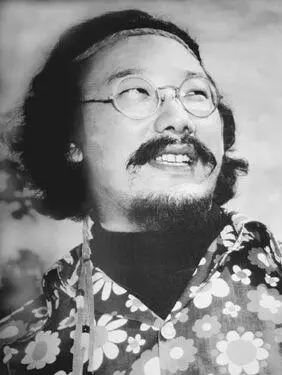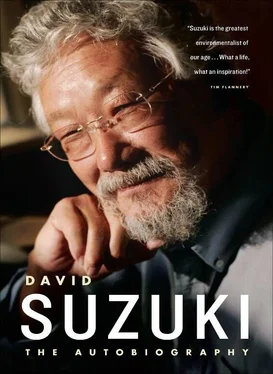We followed the monkeys for the entire day and didn't complete a single stand-up. “I'm so amazed,” Shirley insisted. “They always settle down for a rest.” My brain had slowly turned to mush as the day dragged on and I was cranked up to shoot stand-up 1, then 4, then 3, then 2. All I knew was that I was going to miss my plane, and I did. The next day, the animals performed perfectly, and I was out of there.
One shoot I did had an absolutely amazing effect. Actually, it was a shoot for a still photo, not for a program. In the 1970s, when a program of The Nature of Things failed to get more than a million and a half viewers, we would worry. But with cable and dozens of competing channels, our numbers fell steadily until our average, while still robust for a CBC program, sank below a million. I kept saying, half jokingly, that we could get dynamite numbers if we did a program on the penis, a perfectly good subject for a science show. When Michael Allder became the executive producer, I mentioned the idea and he immediately expressed interest. So he commissioned the program to be done and it focussed on the male obsession with size and some of the techniques used to enlarge the organ. The show was called “Phallacies.”
Michael had wanted a series of new style photos of me for publicity and arranged for a shoot at his cottage in Georgian Bay. As we were leaving the CBC for the shoot, Helicia Glucksman, our publicist handed me a couple of fig leafs and said “If you have time, please have a photo wearing this for ‘Phallacies'.” It was all said lightheartedly and I didn't know whether she was serious or not.
To get the best light, we shot very early the next morning with the rising sun. The photographer was very efficient and we soon had all the pictures Michael wanted, so as a lark, I taped the fig leaf to my crotch and we set up a bench to stand on and pose. Now it was quite cold out so I had to drape a blanket over my shoulders between shots so I wasn't covered in goosebumps. It was a very large fig leaf, so I felt it was pretty modest, but I can tell you, if it had fallen off, it wouldn't have made much difference. As I told you, it was cold. Of course, my Haida friends who saw the picture teased me for needing such a “small leaf.”
Helicia arranged for the photo to be on the cover of the Toronto Star TV Guide and I was astonished to see the reaction when it came out. It was picked up by dozens of newspapers across the country and written up as if it was incredible for me to pose that way. I did receive a couple of letters and one nasty phone call (all from women) expressing disgust at my “obscene photo.” Overwhelmingly, the response seemed to be surprise that even a 64 year old man could still be in reasonable shape. There was even a suggestion that my head had been superimposed on someone else's body. Well, I'll tell you, if we were going to do that, I would have selected a much better body.
I am not a bodybuilder and at my age, testosterone levels are too low to allow me to build up muscle mass, but I had been exercising regularly for decades, ever since I had married a much younger person. Once when my daughter admired a photo of someone's “abs” by saying “Wow, look at this six-pack,” I had interjected, “What about mine?” Sarika retorted, “Dad, you've got a ONE-pack!” I have been gratified that even in my sixties, my body has responded to exercise and after Sarika's jibe, I had developed a series of exercises for my belly and it worked.
We got the best rating for “Phallacies” than we had had for many years but it was bittersweet for me. Staff at my foundation worked hard for years for every story we got into the media on environmental issues. Then I take off my clothes for one shot and we get gangbuster exposure. It wasn't fair.
IWAS BECOMING MORE involved in television when Joane and I separated in 1964. By that time, we had two children and a third was on the way; we didn't divorce until two years later.
Troy had been born in January 1962, and his name came from the father of my roommate in college. In 1956, at the end of my second year at Amherst, my roommate, Howie Bonnett, from Evanston, Illinois, invited me to spend the summer with him with the promise that I could get a job that would pay much more than I made working for Suzuki Brothers Construction back in London. So I went and stayed with his family. Howie's father's name was Troy. I had never known anyone by that name, and I loved the antiquity and masculinity of it. I vowed that if I ever had a son, I'd call him Troy. The high-paying job in Evanston never came through, but I didn't forget that name.
As with so many second-borns, Troy may have suffered from seeming to repeat what his father had already experienced with a first-born. Tami continued to enthrall me with every new behavior and activity. Troy was of a different gender, which was fascinating, but my attention kept turning to Tamiko and the new things she did every year. As he grew older, Troy certainly suffered from the expectations teachers inadvertently laid on him. “Oh, are you going to be a scientist like your father?” they would ask innocently. Or, because Tamiko was a good student, they might say, “Oh, you're Tami's brother,” implying they expected him to do as well. Troy reacted by not trying at all to compete academically.
Troy grew up in a household of a mother and two sisters but, I believe, suffered from the absence of a male figure. My father had played a huge part in his life and tried to be a role model for him, but Troy needed me to be there to help pick him up when he hurt himself, to revel in his successes, to lay down the line when he needed the discipline, and I simply wasn't around enough to fully fill that role. I'm so grateful Troy and I have become closer as the years have gone by, but I have no doubt he bore a heavy burden through my absence.
Laura was conceived before Joane and I had agreed to separate. She was born prematurely, on July 4, 1964, at the very same time I went into the hospital for a month in isolation after contracting hepatitis b from eating contaminated oysters. She developed jaundice, which apparently is quite common among preemies, and the treatment was incubation with light of a certain wavelength. I don't know whether that was the cause, but she developed problems with a “wandering” or “lazy” eye; that may have been a result of her prematurity, but it was never fully corrected by surgery. She was a beautiful child, always quite self-sufficient and happy playing by herself.
When I left hospital, I moved into an apartment near the family so I could still see the kids every day. But when Michael Lerner, an eminent population geneticist at the University of California at Berkeley, invited me to teach a course there, I eagerly accepted. It was an exciting time, and I was thrilled to be living in Berkeley when “flower power” and Haight-Ashbury were blossoming. During my stay, the battle over

Television host of Suzuki on Science (late '60s)
People's Park broke out, and I took part in the demonstrations that ended in tear gassing, buckshot, and death at the hands of the California National Guard, called in by Governor Ronald Reagan. I was appalled at the violent attempt to put down American youth and realized then that my decision to return to Canada in 1962 was still the right one.
I had gone to Berkeley looking like a square, and I came back decked out in granny glasses, a moth-eaten mustache and beard, and bell-bottoms. I had been transformed, much to the discomfort of my fellow faculty at UBC, especially because of what became my trademark — long, nearly shoulder-length hair held in place with a headband.
Читать дальше



![David Jagusson - Devot & Anal [Hardcore BDSM]](/books/485905/david-jagusson-devot-anal-hardcore-bdsm-thumb.webp)









